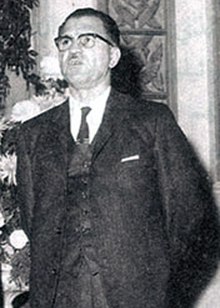
Back عبد الرحمن البزاز Arabic عبد الرحمن البزاز ARZ Abd ar-Rahman al-Bazzaz AST আবদুর রহমান আল-বাজাজ Bengali/Bangla عەبدولڕەحمان بەزاز CKB Abd ar-Rahman al-Bazzaz German Abd ar-Rahman al-Bazzaz Spanish عبدالرحمن البزاز Persian Abdulrahman al-Bazzaz Finnish Abd al-Rahman al-Bazzaz French
This article needs additional citations for verification. (February 2009) |
Abd al-Rahman al-Bazzaz | |
|---|---|
عبد الرحمن البزاز | |
 Al-Bazzaz in 1960 | |
| Acting President of Iraq | |
| In office 13 April 1966 – 16 April 1966 | |
| Prime Minister | Himself |
| Preceded by | Abdul Salam Arif |
| Succeeded by | Abdul Rahman Arif |
| Prime Minister of Iraq | |
| In office 21 September 1965 – 9 August 1966 | |
| President | Abdul Salam Arif Abdul Rahman Arif |
| Preceded by | Arif Abd ar-Razzaq |
| Succeeded by | Naji Talib |
| Foreign Minister of Iraq | |
| In office 6 November 1965 – 11 December 1965 | |
| President | Abdul Salam Arif |
| Preceded by | Naji Talib |
| Succeeded by | Adnan Pachachi |
| 2nd Secretary General of OPEC | |
| In office 1 May 1964 – 30 April 1965 | |
| Preceded by | Fuad Rouhani |
| Succeeded by | Ashraf T. Lutfi |
| Personal details | |
| Born | 20 February 1913 Baghdad |
| Died | 28 June 1973 (aged 60) Baghdad |
| Nationality | Iraqi |
| Political party | Iraqi Arab Socialist Union |
| Alma mater | University of Baghdad King's College London |
| Occupation | Dean of Baghdad Law College |
Abd al-Rahman al-Bazzaz (Arabic: عبد الرحمن البزاز; 20 February 1913 – 28 June 1973)[1] was an Iraqi politician, reformist and writer. He was a pan-Arab nationalist and served as the Dean of Baghdad Law College and later as Prime Minister of Iraq. Al-Bazzaz's main political project was the professionalization of the government through increasing access to civilian expertise. That civic agenda came at the expense of the military. Al-Bazzaz was charged by the Ba'athist-dominated government of participation in activities against the government and he was tortured and imprisoned for fifteen months. Al-Bazzaz was released because of illness in 1970 and moved to London for treatment. He died in Baghdad on 28 June 1973.[2]
- ^ "Index Ba".
- ^ أعيان الزمان وجيران النعمان في مقبرة الخيزران، وليد الأعظمي، بغداد، مكتبة الرقيم، 2001م، صفحة 248